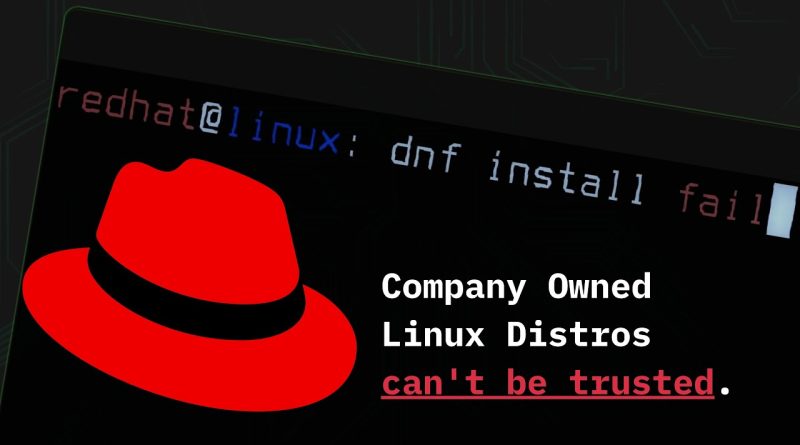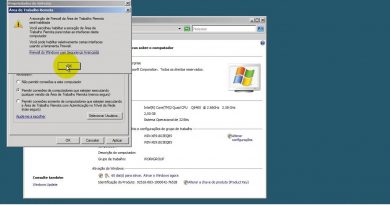Why Corporate Owned Linux Distributions like Red Hat are a Bad Idea
When it comes to Linux Distros, each are either managed by their community or by a company. With recent news, it becomes clearer than ever that those managed by a company should be avoided. With a recent history of being untrustworthy, Red Hat is on the list to steer clear of – but they’re not the only example. With histories of misleading claims (with some being downright lies) it’s time to leave corporate-owned Linux distributions behind. Here’s why.
*Learn Linux TV – Your Home For Linux-Related Fun and Learning!*
*Support Linux Learning (commission earned)*
• Receive a 5% discount on an LPI exam voucher ➜ https://learnlinux.link/lpi-voucher
• Affiliate store for Linux compatible hardware/accessories ➜ https://learnlinux.link/amazon
• Become a channel member here on YouTube ➜ https://learnlinux.link/join
• Become a Patron on Patreon ➜ https://learnlinux.link/patron
• Mastering Ubuntu Server 4th Edition ➜ http://ubuntuserverbook.com
• Set up your own cloud server with Akamai’s Connected Cloud ➜ https://learnlinux.link/akamai
• Awesome KVM for your Homelab ➜ https://learnlinux.link/tinypilot
*Individual Sections*
00:00 – Introduction and what I’ll cover in this video
01:45 – To be fair, Red Hat has had a HUGE impact on Linux
03:10 – A history of Red Hat and CentOS up until now
07:46 – Red Hat is putting source code behind a pay wall?!
09:05 – Now it’s harder for downstream recompiles to exist
10:40 – Can Red Hat do this?
12:00 – Red Hat has a history of breaking trust
13:54 – Canonical ALSO exhibits lesser (but similar) behaviors
19:08 – Why Learn Linux TV has switched AWAY from Ubuntu
— Relevant articles and Links —
• Red Hat and CentOS “Join Forces” ➜ https://learnlinux.link/redhatandcentos
• CentOS 8 Released ➜ https://learnlinux.link/centos8release
• CentOS Stream Announced ➜ https://learnlinux.link/streamreleased
• CentOS Project shifts focus to CentOS Stream ➜ https://learnlinux.link/future-is-stream
• FAQ – CentOS Project shifts focus to CentOS Stream ➜ https://learnlinux.link/centos-faq
• Red Hat strikes a crushing blow against RHEL downstreams ➜ https://learnlinux.link/red-hat-move
• Phoronix Article on Red Hat’s response to this ➜ https://learnlinux.link/rh-response
• What decides success or failure ➜ https://learnlinux.link/market-success
• Gnome as Gnome intended ➜ https://learnlinux.link/stock-gnome
• Ubuntu Flavors ➜ https://learnlinux.link/flavours
*Recommended stand-alone videos from Learn Linux TV*
• Essential tweaks for ALL Linux Servers ➜ https://linux.video/all-servers
• How to create a bootable flash drive for installing Linux ➜ https://linux.video/flash-usb
• Installing an operating system for Raspberry Pi ➜ https://linux.video/pi-imager
• How to connect to a Linux server via ssh ➜ https://linux.video/ssh
• Understanding Linux permissions ➜ https://linux.video/perms
• OpenSSH Guide ➜ https://linux.video/ssh-guide
• How to better secure OpenSSH ➜ https://linux.video/secure-ssh
• 10 Linux Terminal Tips and Tricks to Enhance Your Workflow ➜ https://linux.video/cli-tricks-1
• Over 15 Terminal Tricks You Should Learn ➜ https://linux.video/cli-tricks-2
*Recommended Courses from Learn Linux TV*
• Get up to speed with managing an OpenStack Cloud ➜ https://linux.video/openstack
• Learn how to write your own Bash Scripts ➜ https://linux.video/bash
• Install, configure, and maintain a Proxmox VE Cluster ➜ https://linux.video/pve
• Automate tedious setup jobs by learning Ansible ➜ https://linux.video/ansible
• Learn how to exit vim (and use it too) ➜ https://linux.video/vim
*Linux-related Podcasts*
• Enterprise Linux Security ➜ https://enterpriselinuxsecurity.show
• The Homelab Show ➜ https://thehomelab.show
*Official Learn Linux TV Sites*
• Main site ➜ https://www.learnlinux.tv
• Community ➜ https://community.learnlinux.tv
*FAQ*
• Which distro do I use? ➜ https://learnlinux.link/mydistro
• My recording gear (commissions earned) ➜ https://learnlinux.link/recording-stuff
*Content Ethics*
• The following article covers the rules and guidelines Learn Linux TV abides by ➜ https://www.learnlinux.tv/content-ethics
*Disclaimer*
LearnLinuxTV produces technical content that will hopefully be helpful to you and teach you something new. However, this content is provided without any warranty (expressed or implied). LearnLinuxTV is not responsible for any damages that may arise from any use of the content and information that’s being provided. The viewer is expected to follow best judgement and to make his/her/their best decisions while working with production or non-production software, systems and hardware.
#linux #redhat #opensource
by Learn Linux TV
redhat openstack




Boohoo waah.
what about ubuntu then? i mean its a corporate owned/company owned
I have Ubuntu Linux,
I would go back to Ubuntu if they would just get rid of snaps.. or if someone would come out with a debian base distro that keeps up with Ubuntu .. I would use Sid but even sid is a bit behind for my tastes
I been enjoying F-39 Beta on Fusion, what are everyone's thoughts on that community OS?
I still use ubuntu linux and I don't have a problem with snap packages only 😀
After 20+ minutes explaining why corp distros are unreliable vs independent community projects, you don't do your argument much favour by announcing that you won't be releasing updates for your remix. Your corp criticism seems to be equally applicable, if not more so, to any individual or community, with whom "at any time you might have to change something because of an impulsive decision", to use your words. Perhaps by being a business you don't fall into the community or individual bucket, but probably more so that than a corporation. And perhaps a lack specific broken promise makes a difference, but the premise carries through.
And that's not even considering the time and funding pressures of some non corp projects, which arguably make them even more flaky, with uncertainty about how long they can be sustained, particularly if the individuals or communities are self supporting a project in their spare time. Then again, there's no guarantees with corporations either.
Both have their pros and cons, risks and benefits, and both are susceptible to delighting and disappointing 🙂 Because behind both there are always people with their unique sets of challenges and motivations.
This is why I dual boot Arch and Debian. Bleeding edge software paired with the most rock solid stability.
Nah they got alot of legal problems incoming, taking open source software then writing ontop of it and disregarding the licenses below you is BS. They've lost a few large contracts over this, sad for them lol.
how can one buy something that is open source? 4:58
Hi Jay, have you ever considered starting a discord server where people can ask questions outside of Youtube?
Linux is trusted BECAUSE it is open source. Every other closed source big tech company has totally screwed its users. Big tech can't be trusted.
reminds me of a parent trying to get their child to not something they don't agree with, but the harder they try, the harder the child will push back and rebel.
Well said. Red Hat and Canonical just put drama where there is no need for it, thanks for pointing that out. Cut the drama, use non-Corporate Linux.
Doesn’t NOT releasing the source code violate the GPL, which is the license the Linux kernel is under? Isn’t that like illegal?
Well at least I don’t have to use a certain distribution… for now 😮
People complain about company led open source solutions but there would be far less development without them too. Red hat has Fedora and CentOS streams upstream for the code. RHEL is more about the QA process around the code already available in the upstream projects and the final code is still available.
There is so much wrong with this video… Where would Enterprise use of Linux be without Red Hat? CentOS is still free. Why do you and others feel that you are entitled to the RHEL source?
Now that you have moved away from Ubuntu to Debian does that mean you will be bringing out a Mastering Debian Server book?
In recent talk I heard Fedora Leads say that Fedora is a whitespace for RHEL/ Redhat. That means we the user are "filling the gaps" literally for the company.